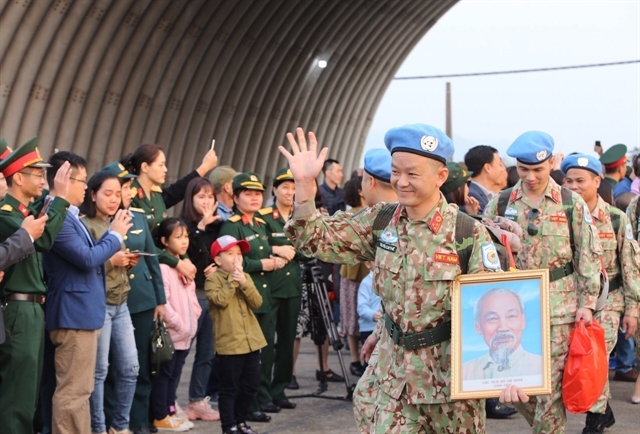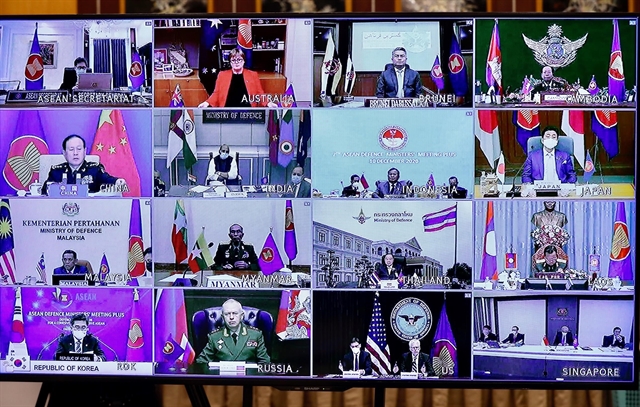 Politics & Law
Politics & Law


|
| Officers wave goodbye to people and colleagues as they left Việt Nam for South Sudan to work in Việt Nam's second field hospital mission to the African country on November 26, part of the UN peacekeeping efforts. — VNA/VNS Photo Dương Giang |
Lieutenant General Nguyễn Chí Vịnh, Deputy Minister of Defence, spoke to Vietnam News Agency about Việt Nam’s defence diplomacy in 2020 and directions for the years ahead as strategic competition intensifies.
2020 has been a rocky year, what are the main difficulties or advantages that the military faced this year?
2020 is the final year of the country’s leadership this tenure, and in the past four years, the military has enjoyed constant and close instructions from the Party, the support and coordination from the Government and has made many achievements.
However, like in many other areas, the defence work and the military faced rows of challenges – not just the COVID-19 pandemic, although it did cause major disruptions to all fields in all regions across the world.
Domestically speaking, Việt Nam has put up a good fight against the pandemic, and the situation is now largely contained but the tasks in dealing with the pandemic remain onerous for the military – including disinfection, guarding the border against illegal entries and arrivals, managing the centralised quarantine facilities with hundreds or thousands of people, and other military medical activities.
In the face of all this, national security, the country’s air, land, and sea territories, sovereignty, and peace must still be safeguarded, so that economic activities could take place undisturbed.
Despite COVID-19, training and exercises in our ranks have not slackened for a moment. The defining characteristic of the military is communal living and activities, and infectious diseases could easily spread in such an environment, but so far, there have been no incidents.
Still, it could be said that our military has strived to not let any major disruptions hampering any activities.
What could Việt Nam do to expand and deepen bilateral and multilateral military and defence ties?
Defence diplomacy, as part of the national foreign affairs policy, is meant to build trust and confidence. The armed forces are fighting to defend the country, but in peace time, they are one special force who contribute to the maintenance of friendship and relations between countries with cooperation activities and commitment to not using force in international relations. Not just us, but every country has been paying more attention to defence diplomacy.
The Party’s documents have clearly stated that we must defend the country “from early and from afar,” referring to the use of peaceful measures in peace time. In defending the country, other than safeguarding the territory, national interests, the administration, and the people, there is also the component of protecting peace, therefore the military must be proactive in diplomatic affairs.
We first prioritise relations with neighbouring countries – such as Laos, Cambodia, China – to ensure amicable ties and secure peaceful borders. If the border situation deteriorates, national development efforts would not be easily possible. We have so far secured this peace across our land border and at the Gulf of Tonkin. But in the East Sea (known internationally as the South China Sea), there are many difficulties but we have managed to hold on to what we have been holding on to, and definitely will persist with our righteous fight for our territory and sovereignty, in line with international law and Vietnamese laws. In addition, other sea-related economic activities like oil extraction, fishing, maritime research, traffic and tourism, etc. are still flourishing.
With regards to ties with major powers or countries with interests concerning Việt Nam, so far we have established defence ties with more than 80 countries, with the principle of prioritising practical cooperation components that contribute to the national defence efforts.
Multilateral-wise, we have made significant strides, especially this year with Việt Nam holding the chairmanship of ASEAN.
In 2019, we became partner to the EU in defence and military activities.
Việt Nam has also become much more active at the UN, with the deployment of Vietnamese peacekeepers to Africa as part of UN missions. 2020 is a special year when Việt Nam for the first time has two military officers qualifying to work the Department of Peace Operations at the UN Headquarters. Other than the fact that this would certainly facilitate our activities, it signifies a higher opinion from the UN towards the role of Việt Nam.
2020 was also a year for Vietnamese female officers to shine. The current ratio of female peacekeepers in our deployment is 17 per cent, higher than any other country. The UN naturally assigns missions without discriminating between females or males, but our female officers have all successfully fulfilled their tasks and got high assessments. Lieutenant Colonel Nguyễn Thị Liên, who made face masks to the staff of United Nations Multidimensional Integrated Stabilisation Mission in the Central African Republic (MINUSCA) and people in the capital city Bangui as well, was presented with a certificate of merits by the mission’s leadership for COVID-19 fighting efforts. The UN highly appreciated her inspiring idea and the sense of responsibility towards the community.

|
| The seventh ASEAN Defence Ministers' Meeting Plus (ADMM+) was held virtually on December 10. — VNA/VNS Photo Dương Giang |
What has defence diplomacy done in elevating Việt Nam’s profile and reputation in the regional and global stage, as Việt Nam this year holds the dual role of non-permanent member to the UN Security and Chairman of ASEAN?
Before 2020, the Government directed all sectors and ministries to prepare for the dual role. There were many promising plans in the works in a bid to make “breakthroughs” in promoting our image and voice on the international stage, but the emergence of the COVID-19 pandemic forced us to rethink the entire agenda.
For the military, since the pandemic, the Ministry of Defence has decided to switch all activities and meetings to virtual format and readjust our agenda, but maintained that international cooperation items with ASEAN and the UN would not be put on hold.
Towards the end of 2020, it could be said that all defence diplomacy agenda we set out have been achieved. Most recently, we held the ASEAN Defence Ministers' Meeting Plus (ADMM+) with the participation of 10 ASEAN countries, eight partner countries and five guest countries – all of them major powers. The meeting saw the attendance of the defence ministers of all delegation countries, despite time difference.
The discussions at the meetings were useful for Việt Nam’s efforts in defending our sovereignty and promoting the country’s image. The topics discussed were agreed by all countries – not an easy feat in the context of increasingly harsh strategic competition between world’s powers.
The meeting has adopted a joint declaration on the strategic security vision of the ADMM+.
This has been the first time in seven years the meeting has been able to issue a joint declaration on issues like the South China Sea, commitment to refrain from use of violence, to comply with international law, to avoid complicating situation or to respect each other’s political regimes. This is a testament to Việt Nam’s geopolitical position, profile, and our efforts to bring major powers to an agreement and not let ourselves be sidelined.
In addition, Việt Nam’s peacekeeping operations – with the deployment of field hospitals to South Sudan and many officers for missions in the Central African Republic and South Sudan – are highly regarded by the UN. Our field hospital in South Sudan has to treat suspected cases of COVID-19 while ensuring no cross-infections would occur.
Another issue is to ensure maintaining exchanges. With the pandemic going on and borders closed, other than virtual meetings, it’s difficult to maintain friendly informal exchanges – especially at the border areas – with our military partners, without leading to the spread of the virus.
Could you give us your assessment of the defence-security situation in general in the years to come? What is the direction for Việt Nam in 2021?
I think in 2021 will continue the trend we witnessed in recent years, with the strategic competition between world’s powers heating up even more and pivoting towards the Asia-Pacific region.
In the midst of this whirlwind, it’s important to promote defence diplomacy, to set the rules ourselves and not idly sit by to passively react to moves from the powerful countries.
All major powers that want to engage in the Southeast Asia must play by the rules set out by ASEAN.
Other than multilateral diplomacy, Việt Nam would need to pay greater attention to bilateral ties – especially neighbouring countries like Laos, Cambodia, and China; our old friends like Russia, Cuba, or developed ones like Japan and South Korea, among others.
The relations with these countries have enormous benefits to our socio-economic development, and defence diplomacy would be a great tool that should be promoted to increase mutual trust and contribute to socio-economic development.
Another field to focus on is remedying the consequences of wars. This is, naturally, the entire system and society’s work, led by the Government, but the Ministry of Defence was tasked as a focal point. In this area, international cooperation is needed to mobilise financial resources, technological capabilities and media and communications. — VNS




